'Climate and the Roman, Late Antique and Byzantine Worlds’
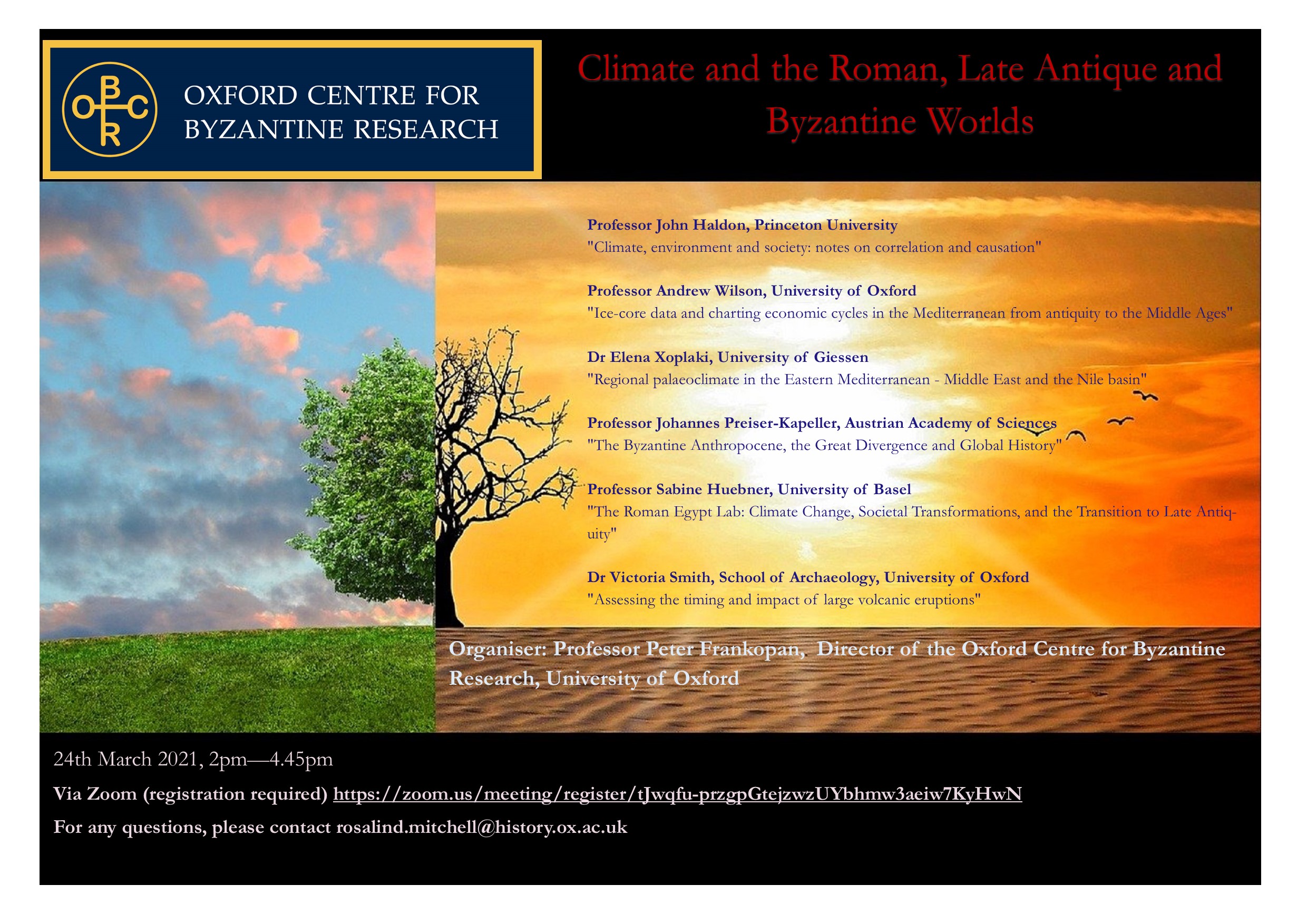

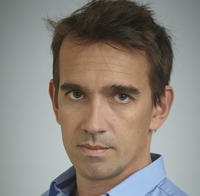
Peter Frankopan is Professor of Global History and Stavros Niarchos Director of the Oxford Centre for Byzantine Research. He works mainly on the history of the Byzantine Empire, Middle East, Central Asia and China and is currently working on a major new project on the history of the environment.
Historians are paying a great deal of attention to climate data when thinking and writing about the past. While part of the reason for this is the current focus on climate change in the modern world, significant advances in climate science are opening up rich and multiple new sources of data, information and insight.
Records from speloethems, fossiled pollen, lake sediment, coral and ice cores (amongst others) represent invaluable resources that help add texture to historical interpretation and in some cases, demand that conventional wisdom be challenged and in some cases over-turned.
This event will gather some of the pioneers of this field to look at some of the opportunities and challenges that climate science presents – with topics ranging from the impacts of major volcanic eruptions and pandemics to socio-economic and cultural change.
To register, please follow this link: https://zoom.us/meeting/register/tJwqfu-przgpGtejzwzUYbhmw3aeiw7KyHwN

Programme:
Session 1: 2.00pm - 3.15pm
Introduction and Opening Comments – Professor Peter Frankopan, University of Oxford
Professor John Haldon, Princeton University
"Climate, environment and society: notes on correlation and causation"
Professor Andrew Wilson, University of Oxford
"Ice-core data and charting economic cycles in the Mediterranean from antiquity to the Middle Ages"
Dr Elena Xoplaki, University of Giessen
"Regional palaeoclimate in the Eastern Mediterranean - Middle East and the Nile basin"
Q&A
Session 2: 3.14pm - 4.30pm
Professor Johannes Preiser-Kapeller, Austrian Academy of Sciences
"The Byzantine Anthropocene, the Great Divergence and Global History"
Professor Sabine Huebner, University of Basel
"The Roman Egypt Lab: Climate Change, Societal Transformations, and the Transition to Late Antiquity".
Dr Victoria Smith, School of Archaeology, University of Oxford
"Assessing the timing and impact of large volcanic eruptions"
Q&A
Conclusions and Way Forward - Professor Peter Frankopan, University of Oxford
To register, please follow this link: https://zoom.us/meeting/register/tJwqfu-przgpGtejzwzUYbhmw3aeiw7KyHwN
For further questions, please contact rosalind.mitchell@history.ox.ac.uk.

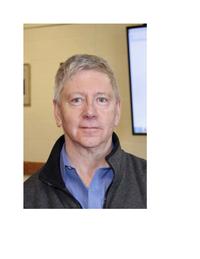
Professor John Haldon |
John Haldon is Shelby Cullom Davis ’30 Professor of European History Emeritus and Professor of Byzantine History & Hellenic Studies Emeritus, at Princeton University. He is currently Director of the Princeton Climate Change and History Research Initiative (https://cchri.princeton.edu/) and Director of the Program in Medieval Studies Environmental History Lab. He is also President of the International Association of Byzantine Studies and is a Corresponding Fellow of the Austrian Academy of Sciences, a member of the Archaeological Institute of America and of the British Institute in Ankara.
His research focuses on the history of the medieval eastern Roman (Byzantine) empire, in particular in the period from the seventh to the twelfth centuries; on state systems and structures across the European and Islamic worlds from late ancient to early modern times; on the impact of environmental stress on societal resilience in pre-modern social systems; and on the production, distribution and consumption of resources in the late ancient and medieval world. |
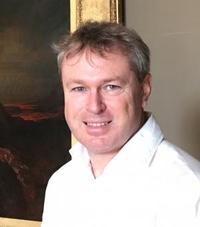
Professor Andrew Wilson |
Andrew Wilson's research interests include the economy of the Roman Empire, ancient technology, ancient water supply and usage, Roman North Africa and archaeological field survey. He co-directs, with Alan Bowman, the Oxford Roman Economy Project (OxREP) (http://www.romaneconomy.ox.ac.uk/), and, with Chris Howgego, the Coin Hoards of the Roman Empire project (http://oxrep.classics.ox.ac.uk/coin_hoards_of_the_roman_empire_project/). With Bob Bewley and David Kennedy, and with David Mattingly at Leicester, He is also conducting a project on Endangered Archaeology in North Africa and the Middle East, using satellite imagery to assess threats to archaeological sites. He has excavated and studied ancient water systems in Italy, Morocco, Tunisia, Libya, Syria, and Cyprus, and am currently involved in excavations at Aphrodisias (Turkey) and Utica (Tunisia). |
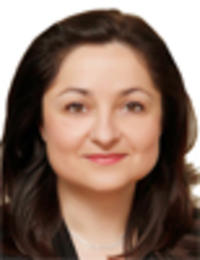
Dr Elena Xoplaki |
|
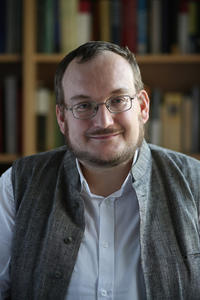
Dr Johannes Preiser-Kapeller |
Johannes Preiser-Kapeller is senior researcher at the Institute for Medieval Studies / Division of Byzantine Research of the Austrian Academy of Sciences. His research focus is the history of the Byzantine Empire and the Mediterranean in the Middle Ages in global comparison and entanglement with special consideration of aspects of environmental history, network theory and complexity studies. His most recent publications include the monographs "Die Erste Ernte und der Große Hunger" and "Der Lange Sommer und die Kleine Eiszeit" (both Vienna 2021) on climate, pandemics and the transformation of the old world in antiquity and middle ages.
|
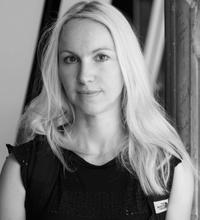
Professor Sabine Huebner |
Sabine R. Huebner holds the chair of Ancient History at the University of Basel in Switzerland, is head of the Basel Doctoral Program in Classical Civilizations and Secretary General of the Federation of Associations of Classical Studies (FIEC). She is the director of the Basel Climate Science & Ancient History Lab (https://altegeschichte.philhist.unibas.ch/de/forschung/forschungsprojekte/climate-science/). Her research focuses on the everyday lives of the common people in the Eastern Roman Mediterranean, on papyrology, and on the social, economic, and religious history of Roman and Byzantine Egypt. She has published monographs including The Family in Roman Egypt (Cambridge, 2013) and Papyri and the Social World of the New Testament (Cambridge, 2019), and is co-editor of The Encyclopedia of Ancient History (12 vols. Oxford, 2012), Growing up Fatherless in Antiquity (Cambridge, 2009), Inheritance, Law and Religion in the Ancient and Medieval Worlds (Paris, 2014), Mediterranean Families in Antiquity (Oxford, 2016), The Single Life in the Roman and Later Roman World (Cambridge, 2019), P.Bas. II, the edition of the Basel papyrus collection (Berlin 2020) and Living the End of Antiquity (Berlin and Boston 2020). |
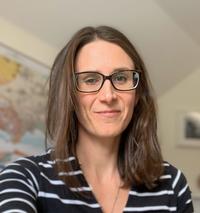
Dr Victoria Smith |
Dr Smith obtained a PhD in Geology from the University of Auckland, New Zealand for her research on the characteristics of volcanic eruptions from the central North Island of New Zealand. After completing her doctorate, Dr Smith moved to the Earth Sciences Department at the University Bristol on a Foundation for Research in Science and Technology (New Zealand) Postdoctoral Fellowship. Her postdoctoral research delved into the magmatic processes that fuel large volcanic eruptions. Following three years in Bristol, Dr Smith moved to the Research Laboratory for Archaeology and the History of Art in the School of Archaeology at the University of Oxford in 2009. She was involved in the Natural Environmental Research Council consortium project ‘Response of Humans to Abrupt Environmental Transitions’ that focused on characterising deposits from volcanoes around Europe, and using these ash layers to correlate and date archaeological sites. Dr Smith’s current research focusses on building detailed records of explosive volcanism across the globe such that ash layers can be used for far-reaching chronology in both space and time. She is particularly interested in the frequency, size and impact of large eruptions, and is currently working on collaborative projects in Japan, Mexico and Italy. |



